Unit 6 When was it invented Section B 1a—1e课件+音频(共15张PPT) 人教版九年级全一册
文档属性
| 名称 | Unit 6 When was it invented Section B 1a—1e课件+音频(共15张PPT) 人教版九年级全一册 | 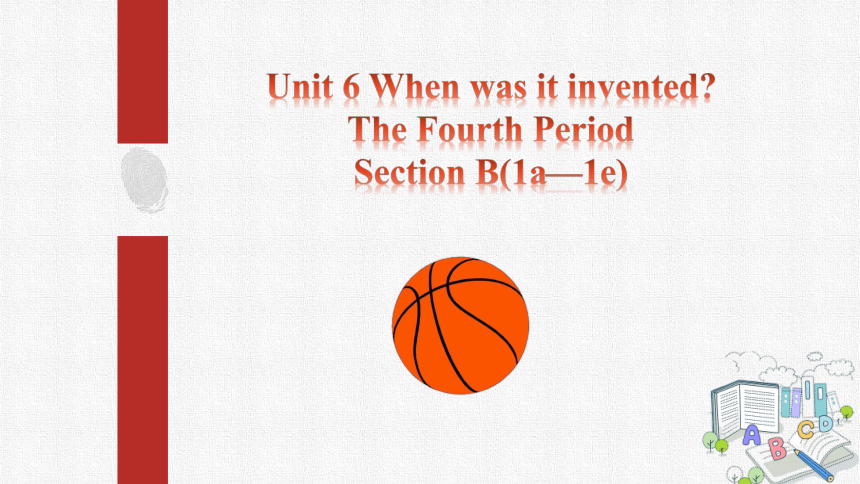 | |
| 格式 | pptx | ||
| 文件大小 | 8.4MB | ||
| 资源类型 | 教案 | ||
| 版本资源 | 人教新目标(Go for it)版 | ||
| 科目 | 英语 | ||
| 更新时间 | 2025-01-05 10:47:32 | ||
图片预览

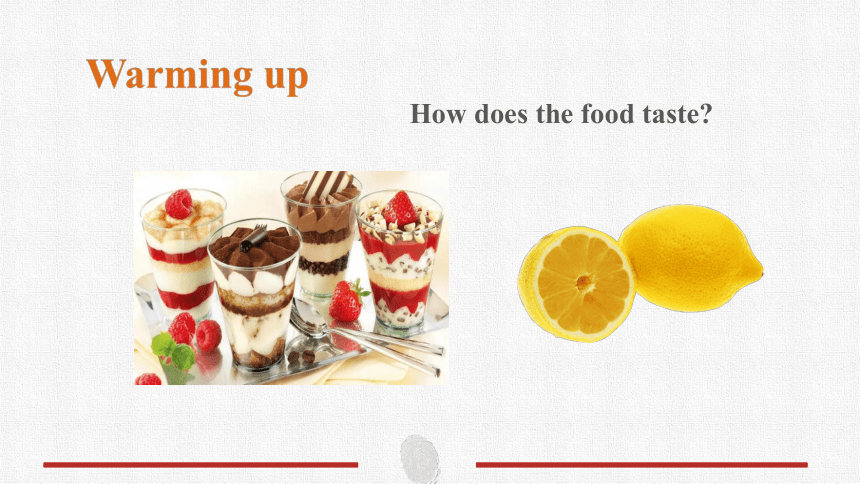
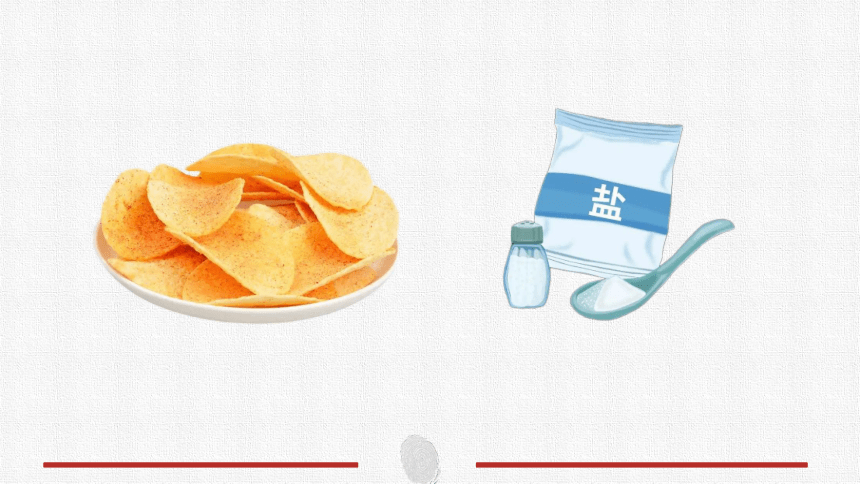
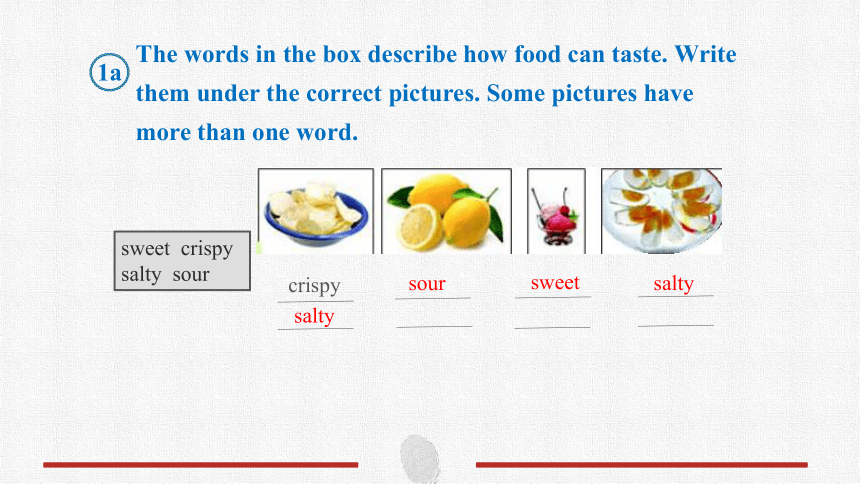
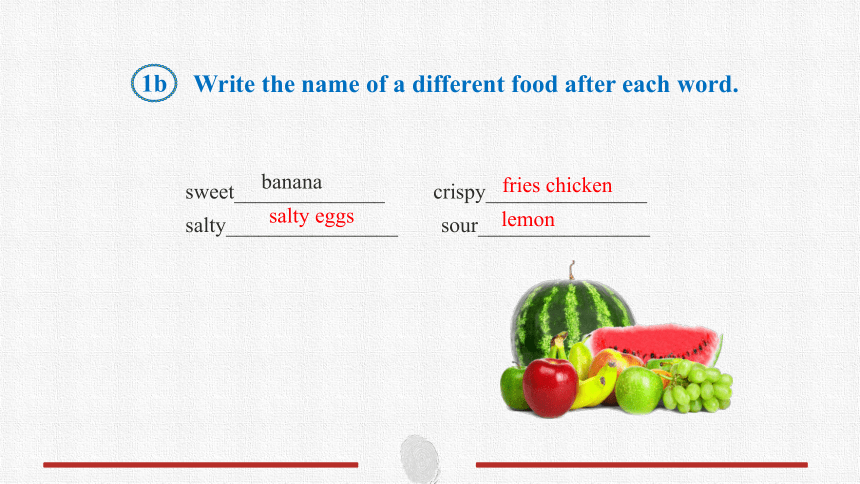
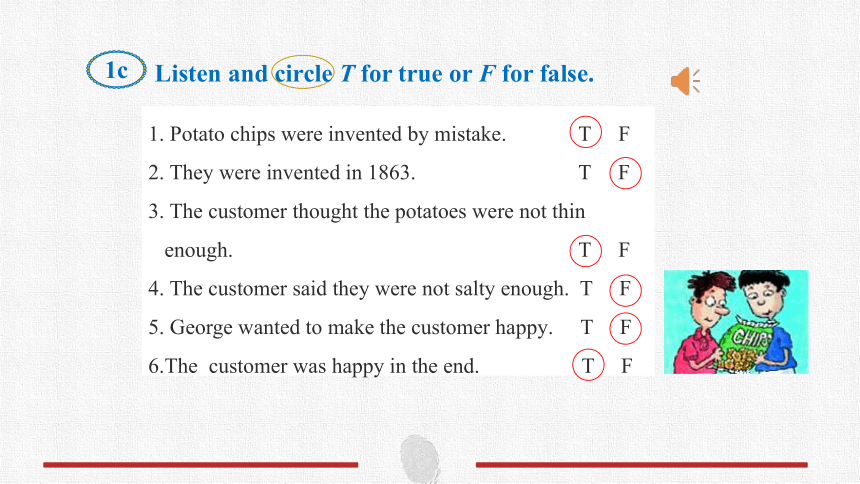
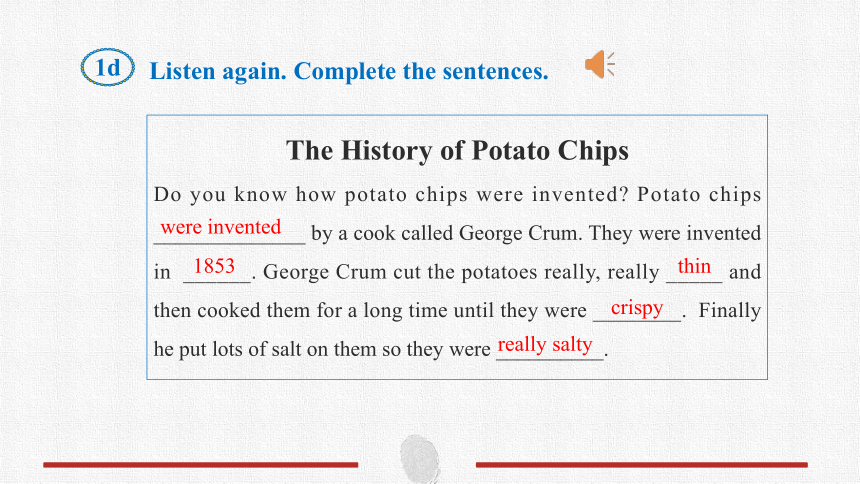
文档简介
(共15张PPT)
Unit 6 When was it invented
The Fourth Period
Section B(1a—1e)
How does the food taste
Warming up
sweet crispy
salty sour
crispy
salty
sour
sweet
1a
The words in the box describe how food can taste. Write
them under the correct pictures. Some pictures have more than one word.
salty
fries chicken
salty eggs
lemon
1b
Write the name of a different food after each word.
sweet______________ crispy_______________
salty________________ sour________________
banana
1. Potato chips were invented by mistake. T F
2. They were invented in 1863. T F
3. The customer thought the potatoes were not thin
enough. T F
4. The customer said they were not salty enough. T F
5. George wanted to make the customer happy. T F
6.The customer was happy in the end. T F
1c
Listen and circle T for true or F for false.
The History of Potato Chips
Do you know how potato chips were invented Potato chips ______________ by a cook called George Crum. They were invented in ______. George Crum cut the potatoes really, really _____ and then cooked them for a long time until they were ________. Finally he put lots of salt on them so they were __________.
were invented
1853
thin
crispy
really salty
1d
Listen again. Complete the sentences.
A: Did you know potato chips were invented by
mistake
B: Wow, I didn’t know that. Who invented them
A: …
1e
Make a conversation about the invention of
potato chips. Use the information in 1c and 1d.
1. salty 咸的
salty 形容词,意为“咸的;含盐的”,是由名词 salt“盐,食盐” 加-y构成的形容词。
e.g. He didn’t have much for dinner because the dishes were too salty. 他晚餐吃得不多,因为菜太咸了。
【拓展】“名词+-y”构成形容词:在英语中,很多名词后加-y可以构成形容词,如:cloud—cloudy, wind—windy, rain—rainy, sleep—sleepy等。
Language Points
2. Potato chips were invented by mistake. 薯条是无意中被发明的。(教材第45页)
by mistake 介词短语,意为“无意中,错误地”。mistake 还可以构成如下常用短语:make a mistake/make mistakes 犯错误;mistake …for…把……错认成……
e.g. I took your pen by mistake. 我错拿了你的钢笔。
Don’t make mistakes any more. 别再犯错了。
I mistook Lily for Lucy yesterday. 昨天我错把莉莉当成了露西。
3.The customer was happy in the end.最后顾客高兴了。(教材第45页)
in the end 意为“最后;最终”,相当于at last, finally, 其后不接 of 短语,本短语强调虽然最初……,最后还是产生了一个……的结果。
e.g. They were out of danger in the end. 他们最后脱险了。
He did one experiment after another and in the end he succeeded. 他做了一个又一个实验,最后成功了。
【拓展】① at the end of…
后接地点名词时,表示“在……尽头”;
后接表示时间的名词时,表示“在……结束时”。
e.g. Walk along the street and you’ll find the hospital at the end of the street.
沿着这条街走,在街道的尽头你就会找到那家医院。
We’ll have an English test at the end of this week. 在这个周末我们要举行一次英语测试。
② by the end of… 意为“在……以前,到……为止”,常用于将来时态和过去完成时态的句子中。
e.g. We will finish the work by the end of this year. 我们在今年年底以前就会完成这项工作。
一、用所给单词的适当形式填空
1. This heated ice-cream scoops were invented by a man _______(call)
Lanmon.
2.—The soup tastes ________.
—Maybe I added too much _______ just now.(salt)
called
salty
Exercise
salt
二、语篇填空之基础训练
1.He met his parents on Christmas in the ___________.
2.We must make the __________ happy.
3.The child took the medicine as sweet by __________.
4.The milk is __________. You must throw it away.
5.The potato chips ________well at that time.
end
customers
mistake
sour
sold
customer end sour mistake sell
1.Remember the words and phrases in this lesson.
2.Write a conversation to talk about something else.
Homework
Unit 6 When was it invented
The Fourth Period
Section B(1a—1e)
How does the food taste
Warming up
sweet crispy
salty sour
crispy
salty
sour
sweet
1a
The words in the box describe how food can taste. Write
them under the correct pictures. Some pictures have more than one word.
salty
fries chicken
salty eggs
lemon
1b
Write the name of a different food after each word.
sweet______________ crispy_______________
salty________________ sour________________
banana
1. Potato chips were invented by mistake. T F
2. They were invented in 1863. T F
3. The customer thought the potatoes were not thin
enough. T F
4. The customer said they were not salty enough. T F
5. George wanted to make the customer happy. T F
6.The customer was happy in the end. T F
1c
Listen and circle T for true or F for false.
The History of Potato Chips
Do you know how potato chips were invented Potato chips ______________ by a cook called George Crum. They were invented in ______. George Crum cut the potatoes really, really _____ and then cooked them for a long time until they were ________. Finally he put lots of salt on them so they were __________.
were invented
1853
thin
crispy
really salty
1d
Listen again. Complete the sentences.
A: Did you know potato chips were invented by
mistake
B: Wow, I didn’t know that. Who invented them
A: …
1e
Make a conversation about the invention of
potato chips. Use the information in 1c and 1d.
1. salty 咸的
salty 形容词,意为“咸的;含盐的”,是由名词 salt“盐,食盐” 加-y构成的形容词。
e.g. He didn’t have much for dinner because the dishes were too salty. 他晚餐吃得不多,因为菜太咸了。
【拓展】“名词+-y”构成形容词:在英语中,很多名词后加-y可以构成形容词,如:cloud—cloudy, wind—windy, rain—rainy, sleep—sleepy等。
Language Points
2. Potato chips were invented by mistake. 薯条是无意中被发明的。(教材第45页)
by mistake 介词短语,意为“无意中,错误地”。mistake 还可以构成如下常用短语:make a mistake/make mistakes 犯错误;mistake …for…把……错认成……
e.g. I took your pen by mistake. 我错拿了你的钢笔。
Don’t make mistakes any more. 别再犯错了。
I mistook Lily for Lucy yesterday. 昨天我错把莉莉当成了露西。
3.The customer was happy in the end.最后顾客高兴了。(教材第45页)
in the end 意为“最后;最终”,相当于at last, finally, 其后不接 of 短语,本短语强调虽然最初……,最后还是产生了一个……的结果。
e.g. They were out of danger in the end. 他们最后脱险了。
He did one experiment after another and in the end he succeeded. 他做了一个又一个实验,最后成功了。
【拓展】① at the end of…
后接地点名词时,表示“在……尽头”;
后接表示时间的名词时,表示“在……结束时”。
e.g. Walk along the street and you’ll find the hospital at the end of the street.
沿着这条街走,在街道的尽头你就会找到那家医院。
We’ll have an English test at the end of this week. 在这个周末我们要举行一次英语测试。
② by the end of… 意为“在……以前,到……为止”,常用于将来时态和过去完成时态的句子中。
e.g. We will finish the work by the end of this year. 我们在今年年底以前就会完成这项工作。
一、用所给单词的适当形式填空
1. This heated ice-cream scoops were invented by a man _______(call)
Lanmon.
2.—The soup tastes ________.
—Maybe I added too much _______ just now.(salt)
called
salty
Exercise
salt
二、语篇填空之基础训练
1.He met his parents on Christmas in the ___________.
2.We must make the __________ happy.
3.The child took the medicine as sweet by __________.
4.The milk is __________. You must throw it away.
5.The potato chips ________well at that time.
end
customers
mistake
sour
sold
customer end sour mistake sell
1.Remember the words and phrases in this lesson.
2.Write a conversation to talk about something else.
Homework
同课章节目录
- Unit 1 How can we become good learners.
- Section A
- Section B
- Unit 2 I think that mooncakes are delicious!
- Section A
- Section B
- Unit 3 Could you please tell me where the restroom
- Section A
- Section B
- Unit 4 I used to be afraid of the dark.
- Section A
- Section B
- Unit 5 What are the shirts made of?
- Section A
- Section B
- Review of Units 1-5
- Unit 6 When was it invented?
- Section A
- Section B
- Unit 7 Teenagers should be allowed to choose their
- Section A
- Section B
- Unit 8 It must belong to Carla.
- Section A
- Section B
- Unit 9 I like music that I can dance to.
- Section A
- Section B
- Unit 10 You're supposed to shake hands.
- Section A
- Section B
- Review of Units 6-10
- Unit 11 Sad movies make me cry.
- Section A
- Section B
- Unit 12 Life is full of the unexpected
- Section A
- Section B
- Unit 13 We're trying to save the earth!
- Section A
- Section B
- Unit 14 I remember meeting all of you in Grade 7.
- Section A
- Section B
- Review of Units 11-14
